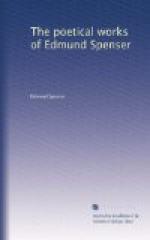So as I muzed on the miserie
In which men live, and I of many most,
Most miserable man, I did espie
Where towards me a sory wight did cost*,
Clad all in black, that mourning did bewray,
40
And Iacob staffe ** in hand devoutly crost,
Like to some pilgrim come from farre away.
[* Cost, approach]
[** Iacob staffe, a pilgrim’s
staff, in the form of a cross]
His carelesse locks, uncombed and unshorne,
Hong long adowne, and bearde all overgrowne,
That well he seemd to be some wight forlorne:
45
Downe to the earth his heavie eyes were throwne,
As loathing light, and ever as he went
He sighed soft, and inly deepe did grone,
As if his heart in peeces would have rent.
Approaching nigh his face I vewed nere,
50
And by the semblant of his countenaunce
Me seemd I had his person seene elsewhere,
Most like Alcyon seeming at a glaunce;
Alcyon he, the iollie shepheard swaine,
That wont full merrilie to pipe and daunce,
55
And fill with pleasance every wood and plaine.
Yet halfe in doubt, because of his disguize,
I softlie sayd, Alcyon! There-withall
He lookt aside as in disdainefull wise,
Yet stayed not, till I againe did call:
60
Then, turning back, he saide, with hollow sound,
“Who is it that dooth name me, wofull thrall,
The wretchedst man that treads this day on ground?”
“One whom like wofulnesse, impressed deepe,
Hath made fit mate thy wretched case to heare,
65
And given like cause with thee to waile and wepe;
Griefe finds some ease by him that like does beare.
Then stay, Alcyon, gentle shepheard! stay,”
Quoth I, “till thou have to my trustie eare
Committed what thee dooth so ill apay*.”
70
[* Ill apay , discontent, distress.]
“Cease, foolish man!” saide he halfe wrothfully,
“To seeke to heare that which cannot be told;
For the huge anguish, which doeth multiply
My dying paines, no tongue can well unfold;
Ne doo I care that any should bemone
75
My hard mishap, or any weepe that would,
But seeke alone to weepe, and dye alone.”
“Then be it so,” quoth I, “that
thou are bent
To die alone, unpitied, unplained;
Yet, ere thou die, it were convenient
80
To tell the cause which thee thereto constrained,
Least that the world thee dead accuse of guilt,
And say, when thou of none shall be maintained,
That thou for secret crime thy blood hast spilt.”
“Who life does loath, and longs to be unbound
85
From the strong shackles of fraile flesh,” quoth
he,
“Nought cares at all what they that live on
ground
Deem the occasion of his death to bee;
Rather desires to be forgotten quight,
Than question made of his calamitie;
90
For harts deep sorrow hates both life and light.




